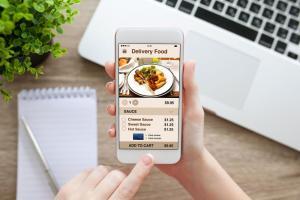According to a report compiled by PwC and Economist Intelligence Unit (EIU), mobile apps for health and fitness are having a revolutionary impact on the field of diagnostics in India

The picture has been used for representational purposes
With the ever-increasing hype and buzz around mobile technology, the food and healthcare industry in India has seen a surge in its innovation, reach and accessibility. When we talk of food apps, it encompasses not one, but a variety of genres like – health, nutrition, fitness, F and B, hospitality, food delivery services, logistics, food e-commerce platforms, etc.
ADVERTISEMENT
According to a report compiled by PwC and Economist Intelligence Unit (EIU), mobile apps for health and fitness are having a revolutionary impact on the field of diagnostics in India, and in terms of the level of adaptation of mobile technologies, the country ranks second among developing countries.
The majority of the app users are women (more than 60 per cent). The peak in tech interventions has led to a tectonic shift in consumer dynamics. The changes are holistic, global and India is part of this sweeping change in consumer habits, seeking healthy and convenient living experiences. Rashida Vapiwala, Founder of LabelBlind categorises some of them as below.
Also Read: Mumbai: Toddler asks food app service for toy; here's what happened next
Health and Nutrition Apps
Nutrition apps have brought nutrition advice to your home. While purists believe that personalised counselling services are still the right thing, these apps have made personalised nutrition information very accessible and affordable for consumers. Apps that record your health profile, daily meals, water, sleep and exercise patterns. Recommendations and solutions are suggested basis of the data. Certain apps give you the caloric counts of regular meal items and recipes that are consumed on a day-to-day basis. Newer web-apps allow consumers to make smart food choices by simplifying nutrition labels on processed food packs and assign a Nutrition Rating to the basis of the products their nutritional value.
Fitness Wearables
The fitness wearable industry contributed to USD 1440 million alone in the fitness industry on USD 1640 million with a 17 per cent year-on-year growth. These wearables include rings, smartwatches, bracelets, pedometers, bands and even your sports gear. Most smartphones come with a pre-installed health app. Apps record your physical activity (step counts), heart rate, sleep patterns, meal intake. Fitness programs, meal plans and mindfulness techniques are suggested basis the data tracked by these devices.
Food Discovery
Restaurant discovery platforms with menu exploration and pre-booking facilities are common. In-app discounts on select restaurants, pre-order features are getting consumers hooked. You can search for restaurants in your locality, by cuisine, by specific menus or by table availability. This is particularly helpful even while you are travelling abroad and are unfamiliar with local cuisines.
Certain apps allow you to order online via the app and then let you eat at the restaurant. This is
great for those who hate waiting in long restaurant queues. Ratings that use factors such as food quality, restaurant popularity, delivery time, and customer satisfaction to recommend the best restaurants in your area. As we speak, globally, food delivery service providers are breaking new grounds in aggregating daily household needs like grocery and even, laundry to deliver them to the customer doorstep.
Food Delivery
Food delivery apps are the new unicorns of the start-up landscape. They deliver almost anything to
anywhere in a certain time period. India's rising middle class has driven the growth of the online
food delivery sector, with research firm RedSeer Consulting saying order numbers rose 176 per cent in 2018. Newer innovations like drones are being tested for food deliveries in India and abroad. This claims to cut delivery time by one-third.
There are 3 clear directions emerging, with the consumer firmly in the driver's seat;
- One, Business operators and consumers, in tandem, are moving at a fast clip on the technical refinement and adoption curve. The technology lag seen in other categories is relatively shorter in the food space.
- Two, as businesses mature and consolidate across the spectrum of food, health, nutrition and fitness, value-added services will challenge the status quo and address tacit consumer needs. (Growth in the smartphone industry and online penetration will lead this development.)
- Three, the consumer will gain by attaining data-backed knowledge, awareness and adoption of good food and physiology habits in the form of conveniences like he/she has never experienced before.
Catch up on all the latest Crime, National, International and Hatke news here. Also download the new mid-day Android and iOS apps to get latest updates
 Subscribe today by clicking the link and stay updated with the latest news!" Click here!
Subscribe today by clicking the link and stay updated with the latest news!" Click here!






